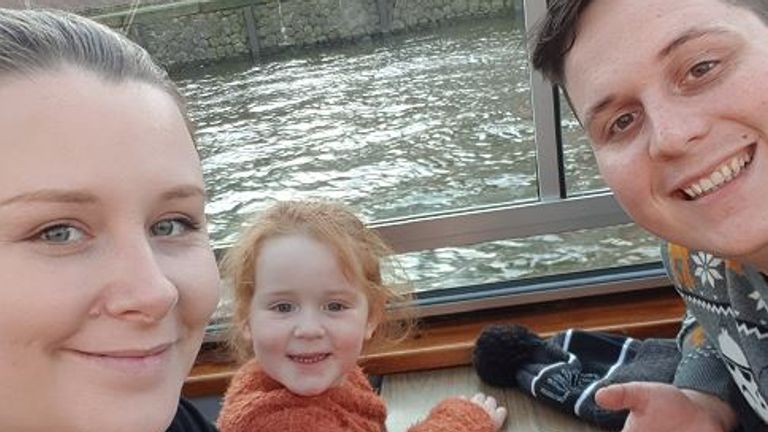Coronavirus: ‘Heartbroken’ pregnant woman faces giving birth alone due to COVID-19
An expectant mother says she will have to give birth alone as social distancing measures force her to keep away from her family.
As the coronavirus continues to spread across the UK, the Royal College of Midwifery (RCM) is advising pregnant women to “start thinking about alternative birth partners” as those with symptoms will not be able to attend.
But Lauren Wildschut, who is 39 weeks pregnant, says she is facing up to the prospect of giving birth completely alone because her husband Joel, her parents and other close relatives are all acutely impacted by the UK lockdown.
The 29-year-old, from Peterborough, told Sky News she was “absolutely devastated” by the prospect.
“My husband is due to be my birthing partner and my parents are due to be looking after our four-year-old daughter when I go into labour,” she said.
“Based on the new lockdown rules, it is now looking extremely likely that I will now have to give birth alone without my husband as he will need to stay home with our daughter. I am absolutely devastated.
“This pregnancy has been quite stressful and now I have to deal with the prospect that I’ll be birthing on my own.”
Pregnant women are among those being classed as vulnerable to COVID-19, along with the elderly and people with health conditions.
The government has asked those groups to be particularly attentive to social distancing.
Mrs Wildschut and her family have been social distancing from her parents since last week because her father is considered as a key worker in the railway industry.
“My father is around people every day, so we are unsure if we want to take the risk of being exposed,” she said.
“My mother-in-law was going to be our back-up, but not only is she a key worker (a carer), she also falls into the vulnerable category.
“All of our close friends and family are either key workers or are vulnerable, and so it’s looking like I will have no other option than to go it alone.
“It will be scary and heartbreaking, but obviously I have to put everybody’s health first as a priority.”
Other countries including France have announced a nationwide ban on birthing partners during the pandemic, with the same measures currently in place in parts of New York – the centre of the US outbreak.
The RCM has said its own guidance may have to be reviewed as knowledge about the disease develops.
Birte Harlev-Lam, the executive director for professional leadership at the college, told Sky News: “If your birth partner does not have COVID-19 or any symptoms, there should be no barriers to them being with you.
“However, if they do have COVID-19 or symptoms of it, they won’t be able to be at the birth.
“This is for your and your baby’s safety, as well as that of the midwives and maternity staff.”
She added: “We know that this is a really worrying time for pregnant women and having the reassurance of their birth partner is more important than ever.”
While experts are not certain as to whether expectant mothers are more vulnerable to the coronavirus, health and safety measures surrounding them during the COVID-19 pandemic have been based on the flu.
Women are at higher risk of complications from flu during pregnancy because they have a weaker immune system, making them less able to fight infections.
One of the most common complications of flu is bronchitis – a chest infection that can develop into pneumonia.
However, guidelines published by the Royal College of Obstetricians and Gynaecologists, Royal College of Midwives and the Royal College of Paediatrics and Child Health suggest COVID-19 cannot be passed on during pregnancy.
Earlier this month it was reported that a newborn had become the youngest coronavirus patient in the UK, but it is thought that they contracted the disease after birth.
Pregnant women who are infected with the coronavirus are also not thought to be at increased risk of a miscarriage, according to the World Health Organisation.
But their guidance states that “all recently pregnant women with COVID-19 or who have recovered from COVID-19 should be provided with information and counselling on safe infant feeding”, and tips to prevent transmission.
Source: Read Full Article



